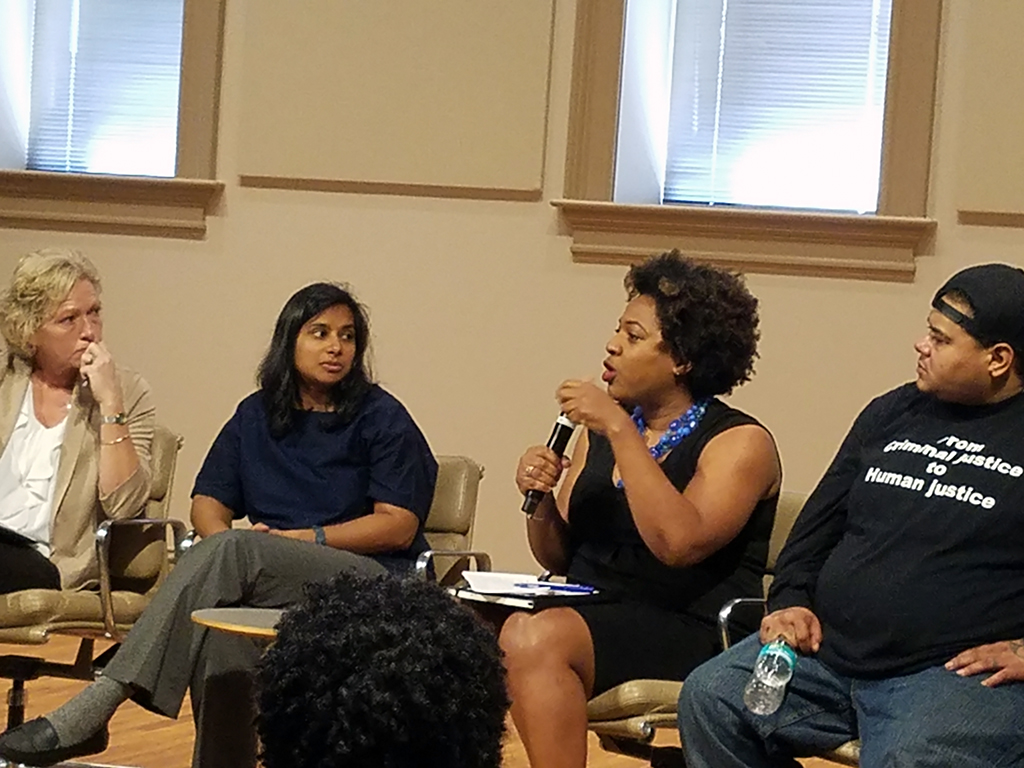WASHINGTON — They arrived sharing the same goal of closing youth prisons, the same desire to address the racial and social disparities they see daily and the same belief that rehabilitating youth is always smarter and more moral than locking them away.
Today’s Youth First conference could have been preaching to the choir of like-minded activists. Instead, speakers and organizers hoped to send attendees out with something they didn’t have: a blueprint to follow as they returned home to work with lawmakers, law enforcement and families of youth charged with crimes.
“One of the goals here was to give specific examples of ideas and approaches that have been proven to work,” said Mishi Faruqee, national field director of Youth First, a national advocacy program focused on ending youth incarceration. “People who came here are facing the same situations that we’ve been facing in New York, or others are facing in Washington or California.”
Today’s program centered around Youth First’s own report, “Breaking Down the Walls, Lessons Learned From Successful State Campaigns to Close Youth Prisons.”
Speakers emphasized the need to have existing youth facilities located in the communities they serve and to make sure families of the youth are involved in all therapy and rehabilitation planning. The session also underscored the need for patience, since in many states the fight to close prisons has lasted two decades or more, with the biggest strides taking place in recent years.
“I think now you are seeing more acceptance at all levels of alternative solutions, because now we have more evidence than ever that working with youth and families works better than anything we’ve ever tried before,” said Amoretta Morris, director of National Community Strategies for the Annie E. Casey Foundation. “It helps very much when we are meeting with elected officials or judges and ... can offer them real statistics and research showing that rehabilitation works.”
Grace Bauer of Justice For Families said the best way to promote change is for advocates to speak bluntly to anyone when discussing youth incarceration.
“If you are talking to your neighbor or a judge, you have to say the same thing. This isn’t about my son, this is good for everyone in the community. And talk to them about the dollars. It doesn’t make sense to spend all that money on a system that doesn’t work — really has never worked.”
Jeff Roman of Youth Justice Milwaukee was inspired to hear stories from New York, Louisiana and other states that have sharply reduced youth incarceration. But he said the reality in his state is much starker.
Earlier this year the American Civil Liberties Union filed a lawsuit alleging widespread abuse at the state’s boys and girls correctional institutes, including accusations that staff routinely pepper sprayed youth, locked them in solitary confinement for minor offenses and sometimes administered beatings.
“It does help to hear people who are having success. In Milwaukee, we just don’t have the same kind of leadership fighting against youth incarceration that you see here,” Roman said. “The bigger problem is we have a governor, a legislature and judges that just don’t seem to care. When the lawsuit came and we had all those stories of abuse, the state didn’t take any real action. That makes a difference.”
Bauer, of Louisiana, said gatherings such as today’s need to followed up by education sessions aimed at judges, probation officers and others in law enforcement who deal with youth.
“Last week there was a training session, and we had a bunch of progressive people coming up with good ideas, but I can guarantee you when they go back to their bosses, they aren’t hearing the same things,” Bauer said. “We have to concentrate on training judges and probation officers. You get criminal justice majors coming out of college with ideas — and a lot of those are for adult crime — and they really don’t know how to deal with youth or work with them.”
This story has been updated.
Hello. We have a small favor to ask. Advertising revenues across the media are falling fast. You can see why we need to ask for your help. Our independent journalism on the juvenile justice system takes a lot of time, money and hard work to produce. But we believe it’s crucial — and we think you agree.
If everyone who reads our reporting helps to pay for it, our future would be much more secure. Every bit helps.
Thanks for listening.
